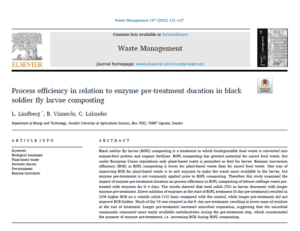Cecilia Lalander från energi och teknik och Anders Kiessling från husdjurens utfodring och vård är med i ett samarbetsprojekt med partners från hela Sverige som just har beviljats 3,8 miljoner kr från FORMAS för ett pilotprojekt där artificiell intelligens ska stötta utvecklingen till ett hållbart urbant livsmedelsproduktionssystem.

Norra Sverige har på senare tiden attraherat stora industrier och serverhallar liksom nästa generations fossilfria stålindustri (H2 Green Steel), p.g.a. stora tillgång till förnyelsebar energi och naturresurser, samt svala klimat. Boden kommun har som målsättning att till 2025 blir Europas mest resurseffektiva och koldioxidneutrala kommun. Faktum är att Boden sedan 2020 har initierat ett storskaligt symbiosprojekt kallat Energisymbiosen Boden, som är en del av Boden Business Park. Ett av initiativen syftar till att skapa en kompetensplattform för urban livsmedelsproduktion som ska användas som en nationell tillgång för att implementera och testa innovativa lösningar för livsmedelsproduktionssystem. Projektet AI för förbättrad effektivitet och hållbarhet hos slutna landbaserade integrerade livsmedelsproduktionssystem – en fallstudie i Boden : iCFPS (intelligent Circular Food Production Systems) kommer att vara en del i den satsningen.
Projektet har som målsättning att avgränsa och modellera de olika energiflödena inom ett hypotetiskt akvaponiskt-agrokultur-produktionssystem för livsmedel, och ska utgöras av ett slutet system bestånden av fyra trofiska lager: insekter, alger, fisk, och växter. Det slutna produktionssystemet som ska vara grunden för modelleringen antas ligga nedströms H2 Green Steel industrin, serverhallar och battericentraler. Från dessa släpps vatten som håller låg värme ut, och kan, om strategiskt kanaliserade, utgöra en värdefull energikälla i det föreslagna slutna livsmedelsproduktionssystemet. De fyra trofiska lagren i det här systemet (insekter, alger, fisk och växter), kan ses som biologiska batterier, med olika lagringskapacitet, som tillsammans buffrar för de ständiga fluktuationerna i systemet. Det övergripande målet med detta projekt är att med hjälp artificiell intelligens (AI) förstå såväl energiflödena som näringsströmmarna i detta system, där spillvärme och biologiskt nedbrytbart avfall för att skapa ett slutet, cirkulärt och hållbart livsmedelsproduktionssystem.
Projektet är ett samarbete mellan Bodens kommun, SWECO, H2GreenSteel, Ragn-Sells, Ecoloop, ONar AB, Johannas Stadsodlingar, Agtira och Tebrito, samt ett konsortium av akademiker från Luleå tekniska universitet, SLU och Umeå universitet.
Det akademiska konsortiet:
- Luleå tekniska universitet (LTU) driver projektet och kommer att utveckla en AI-baserad modell för det föreslagna l I gruppen ingår:
- Ulrika Rova, Prof. Paul Christakopoulos, Prof Marcus Liwicki, Dr Ali Usman och Michael Nilsson som är projektledare.
- Umeå University (UmU), kommer att ansvara för växtdelen av projektet och leds av:
- Docent Olivier Keech.
- Sveriges lantbruksuniversitets (SLU) del i projektet är att producera data för modelleringen rörande de trofiska lagren insekter (ET) och fisk (HUV), samt leda arbetet i referensgruppen bestånden av representanter för Svenska industriprojekt (HUV). Gruppen utgörs av:
- Prof Anders Kiessling (HUV) och Docent Cecilia Lalander (ET).


